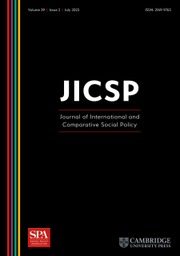Article contents
Speaking to those who know it best: Does participation in an experiment explain citizens’ attitudes to basic income?
Published online by Cambridge University Press: 05 August 2020
Abstract
In this study, we analyse the relationship of participation in the Finnish basic income (BI) experiment and people’s attitudes towards a BI. The experiment, implemented in 2017–2018, aimed to improve citizens’ employment and well-being by reducing the eligibility conditions of basic social benefits and by increasing monetary incentives to find employment. The data on attitudes come from responses to a survey carried out during the experiment. Identical questions were posed to the treatment (receiving the BI) and the control group of the experiment. The contributions of this paper are (1) an estimation of the relationship between participation and opinions on BI, (2) an analysis of the heterogeneity of the relationship and (3) an estimation of the relationship between participation and people’s ability to express their opinions on BI. Our findings indicate that participation in the experiment significantly explains people’s support for a BI and their ability to express opinions.
Information
- Type
- Research Article
- Information
- Copyright
- © The Author(s), 2020. Published by Cambridge University Press on behalf of Social Policy Association
References
- 9
- Cited by

